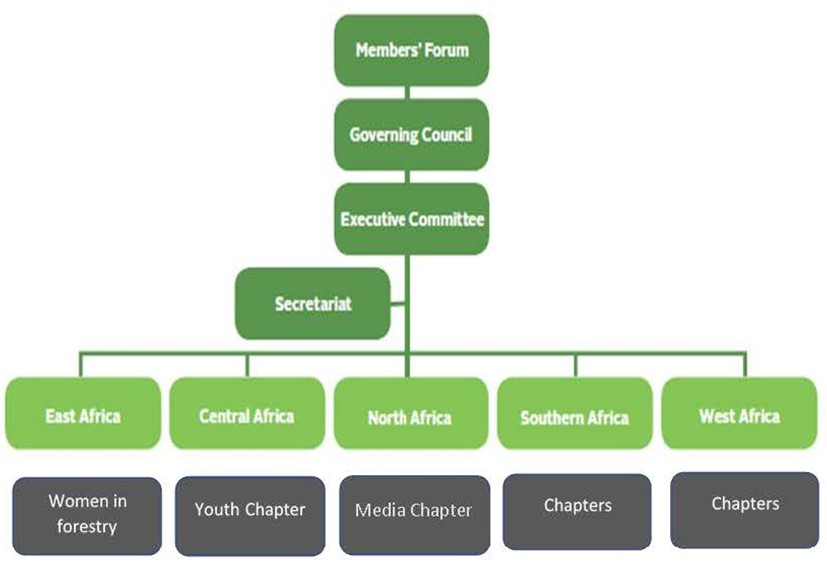At the cooperative level, the Members’ Forum, the Governing Council, the Executive Committee, and the Secretariat are the key organs of the Forum. There are also committees of the Governing Council, including:
- The Executive Committee
- The Technical Support Team (TST) to Raise the Profile of Forestry
- The Working Group on Climate Change
- The Task Force on Resources Mobilisation
- The Finance Committee
To ensure that gender, youth, and media considerations are effectively mainstreamed, the Council has established relevant chapters to provide guidance on these aspects. Each committee and the Governing Council operate with specific purposes and terms of reference, holding onsite, electronic, and virtual meetings as needed. The Governing Council provides overall policy and direction for the affairs of AFF.
At the operational level, i.e., in implementing its activities, AFF works through its members and the Secretariat. In cases where required expertise does not exist within its membership, tasks may be assigned to non-members. Networking via electronic media is the main mechanism for exchanging information, ideas, and views.

In designing and implementing its work, AFF employs the following approaches:
- Networking
AFF develops its plans and strategies through networking with its members and other stakeholders. It shares the results of its work, as well as other gathered knowledge and information, through these networks. AFF aims to build and strengthen networking amongst forestry stakeholders in Africa and beyond.
- Programmatic Activities
Together with stakeholders and partners, AFF develops specific programmes, projects, and activities that address priority issues and opportunities in African forestry. These initiatives are aimed at implementing activities that are of relevance to the continent.
To execute its programmatic work, AFF may:
- Constitute permanent and ad hoc task forces, think tanks, and committees—mainly from its membership—to analyze and advise on specific issues and opportunities.
- Commission experts and institutions to carry out research and studies, either generally or on request.
- Organize workshops, seminars, and conferences as needed.
- Be represented at relevant international and regional forest-related meetings.
- Initiate and implement pilot projects, usually in collaboration with African or other partner institutions.
- Issue reports, publications, and other relevant materials resulting from its work.
- Provide a systematic information base on African forests and trees, including monitoring and evaluation tools.
- Advocacy
AFF engages in advocacy activities that raise the profile of forestry, highlight threats to forest resources, and promote better forest management. It exists to voice the concerns of African forestry stakeholders and to use science, indigenous knowledge, and experience to advocate for the increasing relevance of forests and trees to livelihoods, economies, and environmental stability.
- Policy Advice
AFF provides policy advice to national, regional, and international institutions on how sustainable forest and tree management can contribute to addressing economic, food security, and environmental challenges. The aim is to ensure that African forestry activities and benefit-sharing are guided by effective and inclusive policies.

